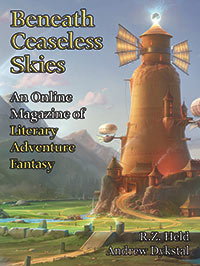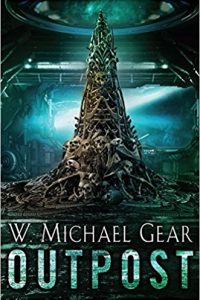Charles Payseur Reviews Short Fiction: Kaleidotrope, Zooscape, Escape Pod, and Drabblecast
![]() Kaleidotrope 4/22
Kaleidotrope 4/22
Zooscape 4/22
Escape Pod 4/22
Drabblecast 4/22
I’ll start off with the Spring Kaleidotrope, which does a good job keeping to a few thematic threads throughout the issue. Though the publication often leans into horror, there’s more of a focus on grief and loss with this group of stories and poems, with recurring ideas of alternate dimensions/universes and sacrifices of various kinds. Aimee Ogden opens the issue with “The Universe Ends on a Tuesday”, which takes a wrenching look at the death of a universe made achingly intimate. The story explores how a single life can fill up an entire reality, the loss of which is no more or less profound than if our own universe were to blink out. “A Difference of Opinion” by Stewart C. Baker shifts to looking at a situation not uncommon in science fiction – a world’s application for entry into a federation of planets and peoples. The work of the two diplomats at the heart of the story is complicated by both the mechanical/AI nature of the applicants and lingering prejudice that tries to justify not considering AIs as people. And through the diplomats and applicant AIs essentially arguing about the “realness” of people actively participating in said argument the story does sharp work exploring practical criteria for personhood in general, and how we empathize and support others in the context of a diverse and far-reaching federation. Despite the familiar trappings, Baker weaves a powerful and fresh narrative. Artificial beings, rights, and cooperation recur in Rebecca Fraimow’s “Fearfully and Wonderfully Made”, where a human consciousness uploaded into an artificial body comes face to face with her past and her possible error about the human soul. The story engages with how science and scientific advancement can be used for great evil, and what responsibility scientists have for the ways their research might be coopted and used to serve violent and corrupt goals. For all it seems that might mean the story deals with clear borders between right and wrong, though, the ending is complex and messy, with all the characters pushed to confront what personal beliefs they’re willing to betray in order to avoid a terrible outcome.
Meanwhile Maria Dong crafts a story of cultural theft and justice in “The Repatriate”. Taking aim at Indiana Jones-style adventurers and academics looking to cash in (however nobly they frame it) on grave robbing and theft, the story follows one such famous explorer as he seeks a fabled and valuable artifact, returning home with it only to find that he’s stepped into a web of forces waiting to hold him to account for his crimes. The story reads as a descent, with the “treasure hunter” trapped by the pull of greed, entitlement, and racism. “From Here” by Grant Stone continues the trend of subverting genre tropes with a situation reminiscent of the end of The Lord of the Rings. A great evil has been defeated, and a broken fellowship faces what to do next, how to move forward. What they choose, though, and how that’s received by the general population who have just been saved, is an interesting statement on heroes, exhaustion, and care. There’s also a lot of poetry to enjoy in the issue, from Lauren McBride’s take on burnout and ambition in “My Summer Retreat” to A.Z. Louise’s celestially scorching and sensual “Hourglass”.
The latest Zooscape opens with an editorial linking furry fiction to fairy tales and folktales around the world and the earliest human storytelling. While the editorial also recognizes that many of these stories are often aimed at young readers, there’s nothing about furry fiction that’s inherently juvenile. To make that point, the issue itself presents a mixture of stories sure to challenge and delight the most seasoned speculative fiction reader, starting with Marissa James’s “Coyote Woman Sings the Blues”. Selkie rules apply here in a story where Coyote Woman’s skin has been taken by an ex who left her instead with two children to raise on her own. The piece shows the place that puts her in, caught between her desire for freedom and obligation and love for her children, and caught as well between the world’s desire for her and her children to be fully domesticated, and the parts of themselves that are wild and beautifully untamed. James does careful and moving work in building up the character of Coyote Woman and allowing her to be both archetypal and deeply unique. “My Song Too Fierce”, by Emily Randolph-Epstein finds a new angle to examine the story of Snow White, opting away from the human characters and finding perspective instead from a bird first compelled by a young woman to help with chores, and then taken by an older witch as familiar. Through all of that, the flavors of captivity and coercion lend the story a weight and complexity outside of the normal dynamics of good versus evil. Instead, readers are treated to a conflict where no side is without violation, and the narrator, for all they are forced to work for the benefit of others, finds strength and purpose instead in reaching for a home and freedom that has been long denied them.
A rite of passage anchors Ife J. Ibitayo’s April Escape Pod story, “The Heroine Kokofe”. Kokofe is on the cusp of adulthood, but must first undergo a trial to be accepted by her tribe, who are settlers on a distant world, living near and in harmony with the native population there. The story is tense and punctuated by moments of intense action, with Kokofe forced to think on her feet and overcome a dangerous enemy. Ibitayo manages a lot of world building while keeping the pacing brisk and the character work engaging.
Catching up with Drabblecast, April brought “When the Sun Hits” by Nick Mamatas, in which the narrator is a literal brain in a jar. Caught in a conflict between the aliens responsible for making the narrator a brain in a jar and their massive, capricious enemies, the narrator is left contemplating scale and scope. Realizing that things that are too massive cause a certain level of anxiety and possible madness, the narrator almost unconsciously begins to compartmentalize, making the too-massive into something easier to survive facing, from the aliens who stranded them to the vast amount of time they spend alone. The result is an interesting take on the mechanics and impact of Lovecraftian horror.
Recommended Stories:
“Fearfully and Wonderfully Made”, Rebecca Fraimow (Kaleidotrope 4/22)
“Coyote Woman Sings the Blues”, Marissa James (Zooscape 4/22)
This review and more like it in the July 2022 issue of Locus.
 While you are here, please take a moment to support Locus with a one-time or recurring donation. We rely on reader donations to keep the magazine and site going, and would like to keep the site paywall free, but WE NEED YOUR FINANCIAL SUPPORT to continue quality coverage of the science fiction and fantasy field.
While you are here, please take a moment to support Locus with a one-time or recurring donation. We rely on reader donations to keep the magazine and site going, and would like to keep the site paywall free, but WE NEED YOUR FINANCIAL SUPPORT to continue quality coverage of the science fiction and fantasy field.
©Locus Magazine. Copyrighted material may not be republished without permission of LSFF.







